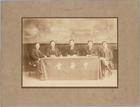In spring 2015 the IISH received the minutes book of the board of Chung Hwa Hui, an association of Chinese students from the Dutch East Indies and Indonesia in the Netherlands, covering the years 1935-1939. Some time earlier, it received a much larger collection. This material has now been made available for research.
 Chung Hwa Hui was founded in 1911 by Chinese students from the Dutch East Indies in the Netherlands. One of the association’s main aims was to support poor students. In 1913 a fund was created for the purpose, the Chung Hwa Hui Hioh Pan. One condition for being awarded a grant was that the applicant had to be a student of Chinese origin from the Dutch East Indies, later Indonesia. Thanks to this fund, many students of Chinese-Indonesian origin were able to study at Dutch universities and colleges. However, in the mid-1960s the association became more or less moribund after its president, Lie Ing Kong, graduated and it proved impossible to find a successor. Like its parent association, the fund continued to officially exist beyond 2000. Both are now defunct however. The fund’s remaining capital was donated to a new Foundation for Chinese Indonesian Heritage (Stichting voor het Chinees Indonesisch Erfgoed), established in 2013.
Chung Hwa Hui was founded in 1911 by Chinese students from the Dutch East Indies in the Netherlands. One of the association’s main aims was to support poor students. In 1913 a fund was created for the purpose, the Chung Hwa Hui Hioh Pan. One condition for being awarded a grant was that the applicant had to be a student of Chinese origin from the Dutch East Indies, later Indonesia. Thanks to this fund, many students of Chinese-Indonesian origin were able to study at Dutch universities and colleges. However, in the mid-1960s the association became more or less moribund after its president, Lie Ing Kong, graduated and it proved impossible to find a successor. Like its parent association, the fund continued to officially exist beyond 2000. Both are now defunct however. The fund’s remaining capital was donated to a new Foundation for Chinese Indonesian Heritage (Stichting voor het Chinees Indonesisch Erfgoed), established in 2013.
 The IISH already held the extensive archive of Chung Hwa Hui’s national council, containing minutes of meetings, correspondence, financial records, membership records, and documents relating to the branches in Leiden, Rotterdam, and Utrecht. The comprehensive supplementary archive that has now been made accessible relates to the Delft branch of Chung Hwa Hui, which was also called Chin Hui. The members of the Delft branch were students at the Technical University there. The branch’s archives contain minutes of meetings of Chin Hui, correspondence, and documents concerning the membership.The archive contains details of the activities of these students from the Dutch East Indies, later Indonesia. It would be interesting to explore their careers after graduating. Did they remain in the Netherlands, or did they return to Indonesia? Or did they find employment elsewhere? (Bouwe Hijma)
The IISH already held the extensive archive of Chung Hwa Hui’s national council, containing minutes of meetings, correspondence, financial records, membership records, and documents relating to the branches in Leiden, Rotterdam, and Utrecht. The comprehensive supplementary archive that has now been made accessible relates to the Delft branch of Chung Hwa Hui, which was also called Chin Hui. The members of the Delft branch were students at the Technical University there. The branch’s archives contain minutes of meetings of Chin Hui, correspondence, and documents concerning the membership.The archive contains details of the activities of these students from the Dutch East Indies, later Indonesia. It would be interesting to explore their careers after graduating. Did they remain in the Netherlands, or did they return to Indonesia? Or did they find employment elsewhere? (Bouwe Hijma)
See also: Chinatown Den Haag, Chinatown Amsterdam and Chinese Spoorzoekers, web expositions of the Historisch Beeldarchief Migranten (in Dutch)
